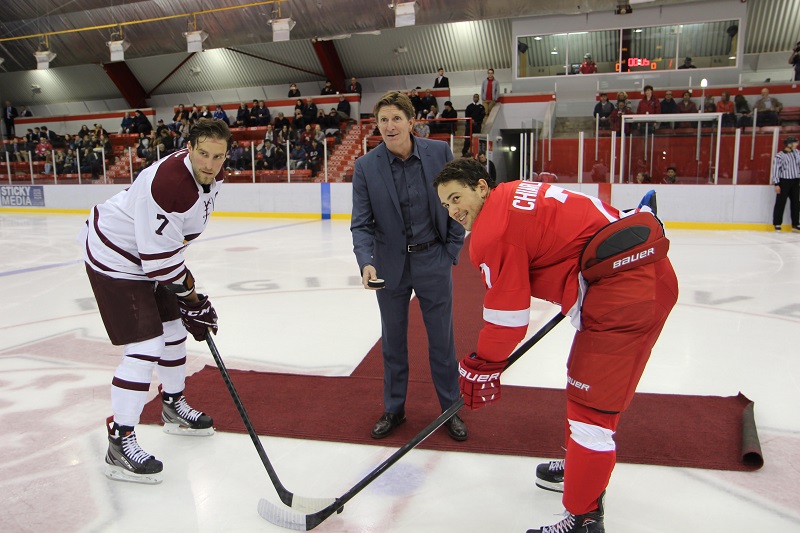Toronto Maple Leafs head coach said he believes university hockey leads to bigger things
Mike Babcock, head coach of the Toronto Maple Leafs, said he believes university hockey is a platform to bigger things in life.
“It develops more doctors, more lawyers and more businesspeople than it does hockey players,” Babcock said. “But that’s the reality of the situation—not all of us can play in the National Hockey League.”
Babcock played university hockey for the McGill Redmen from 1983 to 1987, but never played in the NHL. Instead, he pursued a coaching career that has brought him from the major junior level to the NHL. He’s known for his coaching abilities rather than his playing abilities, and he prefers it to stay that way.
“When you coach in the NHL, unless you played in the NHL, you didn’t play hockey,” he said. “So I don’t spend a whole lot of time talking about my hockey career.”
Babcock attended the Redmen’s game against the Concordia Stingers on Oct. 13 at McGill’s McConnell Arena as part of an alumni event. The Stingers won the game 3-2.
McGill and Concordia’s crosstown rivalry was evident during the men’s hockey game, as there were 30 combined penalty minutes between the two teams. But Babcock doesn’t remember much of the McGill-Concordia rivalry during his playing days.
“I don’t remember a ton,” he said. “I remember it being a big deal at the time, and you obviously wanted to have success in a big rivalry, and it was a lot of fun.”
Before the game, Babcock performed a ceremonial puck drop between McGill captain Nathan Chiarlitti and Concordia captain Philippe Hudon. Hudon and Babcock both have a connection to the Detroit Red Wings—Babcock used to coach the Red Wings, the same team that drafted Hudon in the fifth round of the 2011 NHL Entry Draft. But Babcock might not remember who Hudon is.
“I always say to the young guys, if they’re real good players, I won’t even know who they are until they get to my league. Then I’ll know their name,” Babcock said.
Babcock began his NHL coaching career with the Mighty Ducks of Anaheim in 2002. He took them to the Stanley Cup final in 2003 only to lose to the New Jersey Devils. He then began coaching the Red Wings in 2005, and would stay behind the bench until he left to coach the Toronto Maple Leafs in 2015. The Red Wings won a Stanley Cup in 2008, and lost in the final to the Pittsburgh Penguins in 2009.
Babcock also coached the men’s Team Canada to a gold medal in the World Ice Hockey Championships in 2004 and to two Olympic golds in 2010 and 2014. But after so many years of coaching at the professional level, he hasn’t watched much university hockey.
“The longer you’re in the NHL, the less you know about the other leagues,” he said. “I’m not a scout, so I don’t see other leagues. I watch the NHL.”
Regardless of whether he follows U Sports hockey or not, Babcock said he believes university athletics are valuable to a student’s life.
“[University] is a platform to give you confidence in yourself academically, athletically, emotionally and relationship-wise,” he said. “So to me, that’s the platform that’s going to send you out into the world knowing that you could conquer whatever you put your mind to.”
Babcock added that playing university hockey opened a lot of doors for his coaching career. “To be an athlete and compete for your school, it’s something very special and leads to more things in your life. I looked at it very fondly.”
Main photo courtesy of Josh Blatt, McGill Athletics
